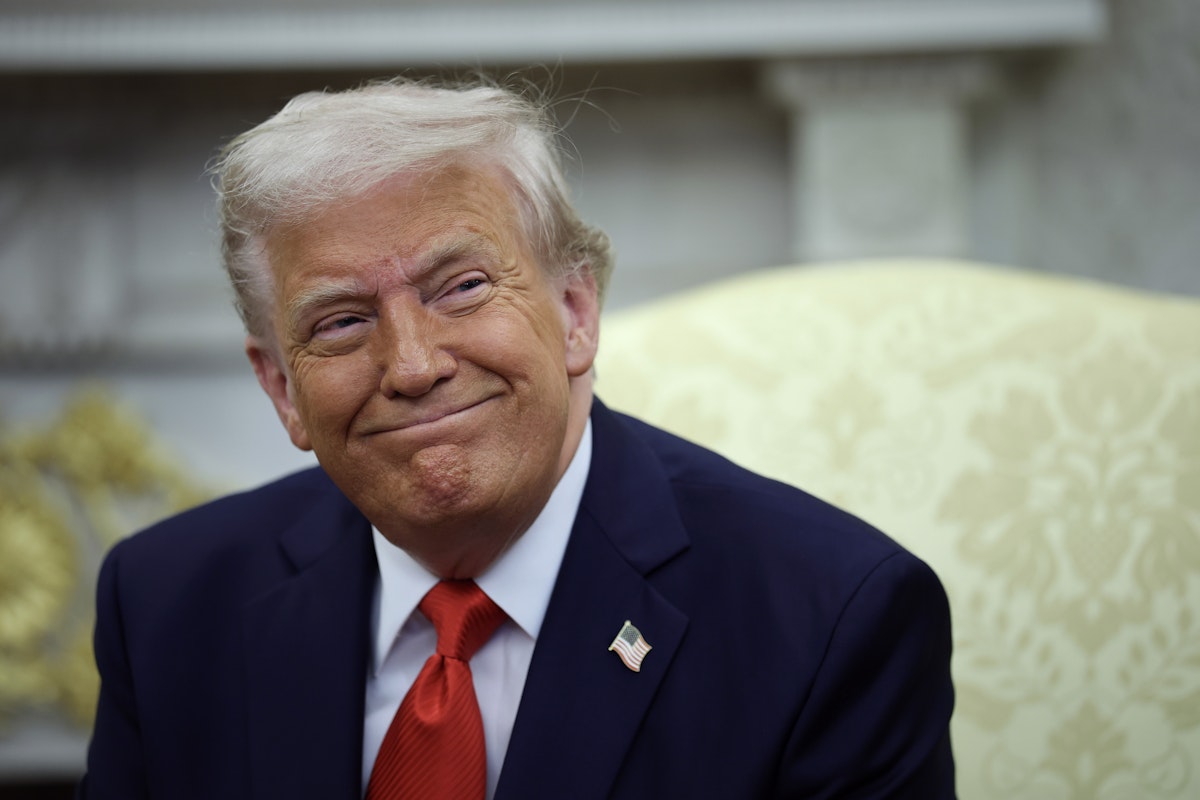Sometime in the next year, the United States will almost certainly slide into a recession, if not something altogether worse. Last week, Federal Reserve Chair Jerome Powell warned that “there isn’t a modern experience of how to think about” the current economic situation: an unprecedented trade war, anemic growth, rising unemployment, and ballooning inflation—a recipe for potentially catastrophic stagnation. On Tuesday, The Wall Journal found that, nearly two weeks after President Trump had paused much of his trade war, the stock market was still on pace for the worst April since 1932.
And what might Trump’s answer be to this economic havoc? To fire Powell. His attacks on the Fed chair have been growing over the past week—on Monday, he wrote on Truth Social that “there can be a SLOWING of the economy unless Mr. Too Late, a major loser, lowers interest rates, NOW”—and National Economic Council Director Kevin Hassett has confirmed that Trump is considering firing him. Should Trump do so, it may not be as catastrophic as his tariffs. But it nevertheless shows that Trump has learned nothing from his disastrous trade war, and that he is determined to enact maximum economic destruction on America.
If and when a recession comes, it will have a clear author: Trump, who has embarked on a path that can only be described as economic suicide. Despite being warned of the economic consequences, he slapped gargantuan tariffs on the entire world—minus North Korea and Russia, of all places—based on the quixotic belief that these would enrich the U.S., bringing about a prosperous age in which American workers labor in factories, producing pretty much everything. It’s a simply delusional vision, and one that would take decades to see through.
When Trump backed down on the trade war on April 10, pausing tariffs on most of the world except China, markets breathed a sigh of relief. There was a hope that he had learned his lesson and would ultimately return to the laissez-faire economic management that defined most of his first term. That was a ridiculous conclusion to draw then, and it’s even more absurd now that Trump might fire Powell—the very possibility of which has sent the markets spiraling further.
It is tempting to shrug off Trump’s desire to fire Powell. Trump has been complaining, with increasing regularity and viciousness, about the performance of the Fed chair more or less since he appointed him in late 2017. Trump despises the administrative state generally, but it’s easy to understand why he detests the Federal Reserve in particular: It wields vast power—its decisions to raise or lower interest rates move global markets in the short term and shape the economy in the long term—with more or less total independence. Trump wants that power, like he wants all power, for himself.
Of course, firing Powell won’t accomplish that. Trump himself can’t be chair, and there is no guarantee that a new chair appointed by him would do what he wants, which is to slash interest rates—or, for that matter, that slashing interest rates would improve the economy in the short term, let alone stave off a recession. Trump could remove Powell, in other words, and nothing much would change. Even if a new chair was determined to try to soften the blow of Trump’s tariffs—Fed board member Kevin Warsh, a loyalist and trade war enthusiast, has been floated—the larger economic situation is so bad it’s possible there would be no substantive result. Even if the Fed did lower interest rates, there’s no guarantee that other rates would fall—or, for that matter, that doing so would offset the damage of Trump’s ongoing trade war. The yield curve is just that bad right now.
Powell is currently holding onto his job in part because of the perilous position that Trump has put the economy in. The market plummeted when it seemed likely that Powell would get the ax, and most reporting suggests that the president is holding off solely because he can’t stomach another sell-off right now. But make no mistake: Trump very much wants to get rid of Powell, and he almost certainly will do it the moment he thinks he can get away with it.
I can’t speculate what the long-term effect of firing Powell on the markets or the economy would be. But even if it is minimal, which seems more than possible, the fact that Trump has looked at the gyrations of the last six weeks and decided that he should have more power and control over the economy should be alarming for everyone. Having experienced the profound fallout from leveling a massive, apparently ChatGPT-generated series of tariffs on nearly the entire world, Trump has come to the conclusion that the real problem with the economy is the chair of the Federal Reserve.
That Trump is incapable of personal growth or self-reflection is, like his feud with Powell, hardly new. It is the basic fact of his personality and at the heart of his political appeal: He never says he’s sorry and always finds a scapegoat. But the consequences of his actions have never been more profound or catastrophic. Trump narrowly avoided economic Armageddon two weeks ago, and already he’s tempting it again.
Read More Details
Finally We wish PressBee provided you with enough information of ( Donald Trump Is Hell-Bent on Destroying the Economy )
Also on site :
- Trump says reconciliation with Musk is possible in interview before Tesla boss’s apology
- US condemns multi-nation sanctions on far-right Israeli ministers
- What we know about aid queue killings in Gaza

